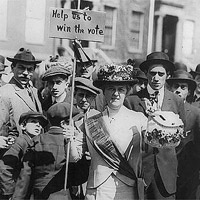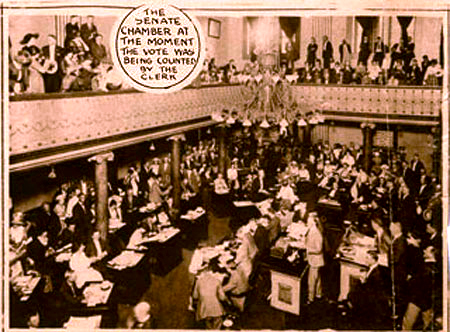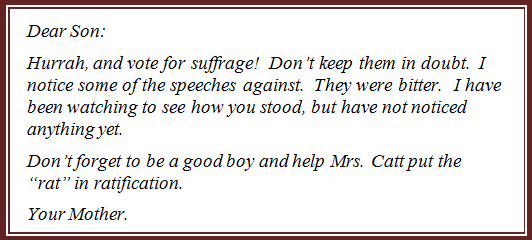Like Mother, Like Son
by Andrew Boyd
Today, a mother's influence. The University of Houston's College of Engineering presents this series about the machines that make our civilization run, and the peoplewhose ingenuity created them.
Following an arduous, decades long effort by suffragists, in 1919 the U. S. Congress passed the nineteenth amendment giving women the right to vote. But the battle wasn't over. The amendment still had to be ratified by three-fourths of the states. And there remained strong pockets of opposition, primarily in the South.

A year after Congress sent the amendment to the states, the suffrage movement found itself one state short of ratification. And none of the remaining states had legislative sessions scheduled until after the 1920 presidential election. Suffragists would miss an important election cycle if something didn't happen. And the suffrage movement could be pushed back years or decades if it lost its momentum.
So President Woodrow Wilson convinced the governors of North Carolina and Tennessee to call special legislative sessions. The North Carolinian legislature voted down the amendment. That left things in the hands of Tennessee's legislators. Unwillingly, Tennessee found itself the 'pivotal battleground of the nation.'
The outcome was uncertain. Twelve years earlier, Tennessee's governor had proclaimed 'Let the women pray and the men vote,' a sentiment that still resonated with many Tennesseans.
Suffragists and anti-suffragists came pouring into Tennessee to influence the outcome. Political chicanery abounded. In spite of prohibition, liquor flowed freely as legislators met in closed door sessions with lobbyists on both sides. Suffragists from out of state asked officials to enforce prohibition laws. It didn't happen. 'In Tennessee,' the suffragists were informed, 'whiskey and legislation go hand in hand.'
When the state legislature finally convened, the amendment quickly passed the Senate. But the House was another matter. Both sides had counted votes, but with so much back room dealing no one was sure of the outcome.

One representative in particular was a wild card — Harry Burn, a twenty-four year old from a rural mountain district. Burn himself was noncommittal, but those he represented were overwhelmingly opposed to women voting. Suffragists crossed their fingers as it came time for Burn to cast his vote. But they needn't have worried. Tucked in his pocket was a letter from his mother, insisting that he 'be a good boy' and vote in favor of the amendment. The young man proved to be an admirable son. The amendment was ratified by the House without a single vote to spare. And Febb King Ensminger Burn, Harry's mother, carved a place for herself in history right alongside her son's.

I'm Andy Boyd at the University of Houston, where we're interested in the way inventive minds work.
Notes and references:
For a related episode, see AMERICAN WOMEN'S SUFFRAGE AND ALICE PAUL.
Special thanks to Professor Landon Storrs of the University of Houston Department of History for research materials used in preparing this episode.
A. Sims. 'Armageddon in Tennessee: The Final Battle Over the Nineteenth Amendment.' In: One Woman, One Vote: Rediscovering the Woman Suffrage Movement. M. S. Wheeler, ed. Troutdale, Oregon: NewSage Press, 1995.
The 'help us to win the vote' picture is from the Library of Congress. The newspaper clipping and text of Ms. Burn's letter to her son are taken from the Tennessee State Libraries Web site.